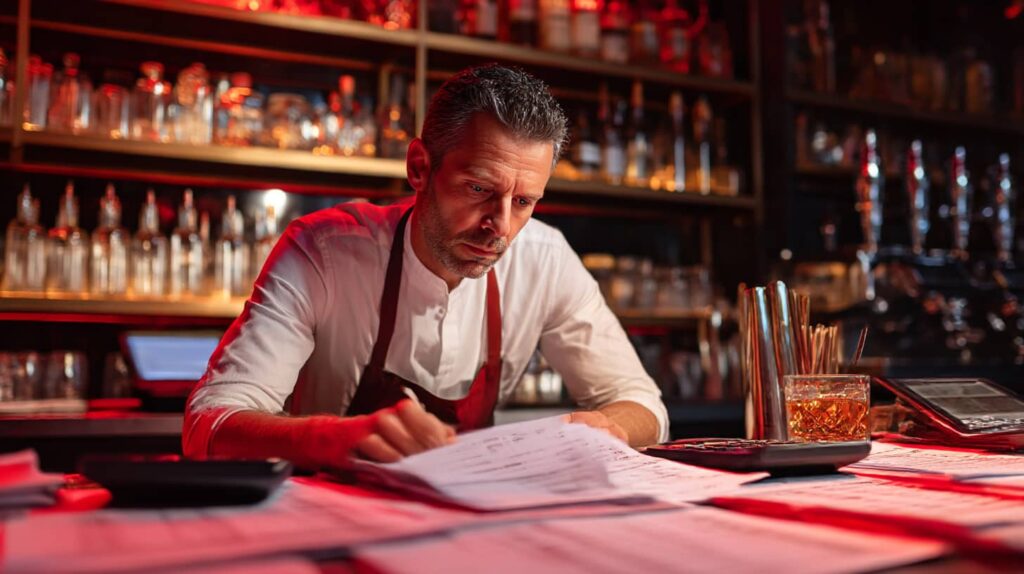The figures don't lie. A restaurateur opens his books and ruthlessly does the maths: What does a bartender really cost? What does a cocktail machine cost in the long term? The result shocks even experienced industry professionals.
Welcome to the most honest cost accounting in the catering industry.
The hidden costs of a bartender
What does a bartender cost? 2,800 euros basic salary, most people think. A fatal error.
An experienced restaurant owner does the maths:
Basic salary: 2,800 Euro
Social security contributions: 578 Euro
Holiday replacement: 280 Euro
sickness absence: 168 Euro
Induction of new staff: 150 Euro
Absenteeism compensation: 220 Euro
Insurance against theft: 45 Euro
Real monthly costs: 4,241 euros
"For years, I thought my bartender cost 2,800 euros. In fact, it was over 4,200 euros. Plus the hidden costs."
The hidden costs are the killer
Which is not included in any statement:
Losses due to overdosing: 180 euros per month
"Sometimes 4cl, sometimes 6cl - with 200 cocktails a day, that adds up."
Recruitment in the event of redundancies: 800 euros per change
"Job adverts, job interviews, trial work - that costs time and money."
Fluctuations in quality: Unquantifiable, but noticeable
"Monday perfect, Friday sloppy after 10 hours. Guests notice that."
Loss of flexibility: "Spontaneous events? Impossible without available staff."
The brutal 5-year bill
Scenario: Medium-sized restaurant, 50 cocktails a day
Bartender costs (5 years):
| Cost type | Year 1-5 | Total |
|---|---|---|
| Personnel costs | 4,241€/month | 254.460€ |
| 2x change of personnel | 1.600€ | 1.600€ |
| Bar losses | 180€/month | 10.800€ |
| Downtime costs | 150€/month | 9.000€ |
| TOTAL COSTS | 275.860€ |
Cocktail machine costs (5 years):
| Cost type | Year 1-5 | Total |
|---|---|---|
| Acquisition/leasing | 350€/month | 21.000€ |
| Maintenance | 120€/month | 7.200€ |
| Electricity costs | 35€/month | 2.100€ |
| Saving on ingredients | -50€/month | -3.000€ |
| TOTAL COSTS | 27.300€ |
Savings through automation: 248,560 euros in 5 years
The shock realisation
"These figures blew me away," admits a hotelier from Frankfurt. "I could have bought a second restaurant with what I spent on bartenders."
His bill after the changeover:
- Monthly savings: 3,891 Euro
- Annual savings: 46,692 Euro
- ROI of the machine: 5.4 months
But what about the quality?
The quality comparison is surprising:
Bartender (reality):
- Quality varies depending on the day
- Portions vary between 10-30%
- Speed decreases under stress
- Consistency depending on mood
Cocktail machine:
- Millimetre-precise dosing
- Identical quality with every drink
- Constant speed
- Independent of external factors
A restaurant tester comments: "I no longer recognise cocktails from good machines from those of experienced bartenders. They are often even better."
The emotional costs
What calculations do not capture:
Stress level of the management:
- No more worries about spontaneous cancellations
- Plannable costs without surprises
- No recruitment in the peak season
A restaurateur from Munich: "I'm sleeping peacefully again. No late-night calls about sick bartenders, no panic about weekends."
The hard facts for sceptics
Sceptic argument: "Guests want human service."
Reality: 78% of guests rate machine-made cocktails as equivalent or better.
Sceptic argument: "Machines are impersonal."
Reality: Service staff have more time to look after guests.
Sceptic argument: "What happens in the event of defects?"
Reality: Modern machines have 99.7% availability.
The turning point
When is it worth switching?
From 30 cocktails a day, automation is cheaper. From 50 cocktails a day, the difference becomes dramatic. From 100 cocktails a day, not using automation is economic suicide.
The calculation is clear: Time is money, consistency is quality, automation is the future.
The brutal conclusion
248,560 euros saved in five years. That is the truth beyond all romanticism. The question is not whether you can afford automation.
The question is: can you afford to do without it?
